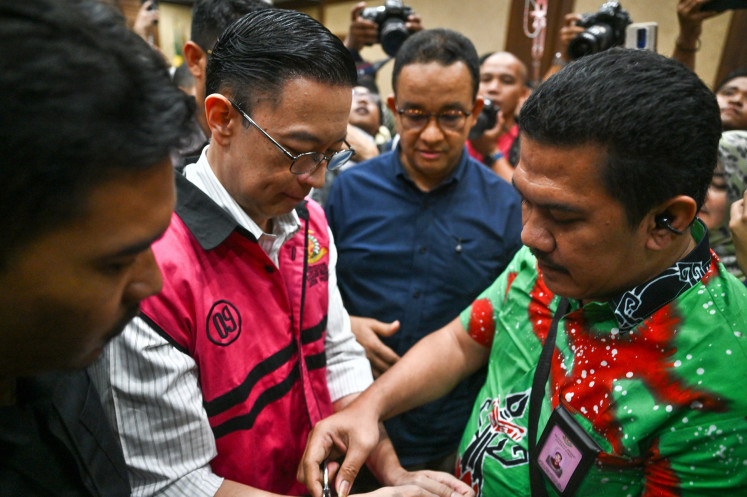Popular Reads
Top Results
Can't find what you're looking for?
View all search resultsPopular Reads
Top Results
Can't find what you're looking for?
View all search resultsDJ Dangerdope runs 'amok' with Sutardji's poetry in documentary
âAmukâ: The director combines poetry with sampling and a bit of documentary, depicting DJ Dangerdope (aka DJ Rencon from Aceh) sampling, among others, the late literary critic HB Jassin reading Sutardjiâs âAmukâ
Change text size
Gift Premium Articles
to Anyone
![âAmukâ: The director combines poetry with sampling and a bit of documentary, depicting DJ Dangerdope (aka DJ Rencon from Aceh) sampling, among others, the late literary critic HB Jassin reading Sutardjiâs âAmukâ. (Courtesy Good News Film)" border="0" height="311" width="498"><span class="caption" style="width: 496px;"><strong>âAmukâ: </strong>The director combines poetry with sampling and a bit of documentary, depicting DJ Dangerdope (aka DJ Rencon from Aceh) sampling, among others, the late literary critic HB Jassin reading Sutardjiâs âAmukâ. (Courtesy Good News Film)</span></span></p><p>Well-known classic sampling DJ Dangerdope is teaming up with documentary director Ari Rusyadi to remix the words of one of Indonesiaâs most famous poets, Sutardji Calzoum Bachri.<br><br>The poetry of Sutardji, born in Rengat, Riau in 1941, has a style of an âintimate, almost confessional orationâ according to fellow poet Leon Agusta, who also described Sutardji as a âbottle poetâ, frequently presenting his work while drinking.<br><br>In the film Amuk, which has its premiere on Friday at the Goethe Haus in Central Jakarta, Ari Rusyadi combines poetry with sampling and a bit of documentary, depicting DJ Dangerdope (aka DJ Rencon from Aceh) sampling, among others, the late literary critic HB Jassin reading Sutardjiâs âAmukâ.<br><br>The poem â from which the documentary takes its name â was lauded by the Jakarta Arts Council (DKJ) in 1976, when Sutardji gave what was reported as an amazing performance of the piece.<br><br>Ari is no stranger to alternative documentary filmmaking. He also directed, with Nicholas Yudifar, Mocca: Life Keeps on Turning, about the famed indie pop band from Bandung, West Java, and Jakarta Tark, exploring Jakartaâs fixed gear scene.</p><p><span class="inline inline-none"><img class="image image-img_assist_custom-498x312 " src="http://202.158.21.182/files/images2/p22-eoldschool.img_assist_custom-498x312.jpg" alt="Old school: Dangerdope approached the collaboration seeking to use music tools more suited to the period of Sutardjiâs poetry. (Courtesy Good News Film)" title="Old school: Dangerdope approached the collaboration seeking to use music tools more suited to the period of Sutardjiâs poetry. (Courtesy Good News Film)" border="0" height="311" width="498"><span class="caption" style="width: 496px;"><strong>Old school: </strong>Dangerdope approached the collaboration seeking to use music tools more suited to the period of Sutardjiâs poetry. (Courtesy Good News Film)</span></span><br>âI became interested in Sutardji,â Ari recalls. âHe was provocative and outstanding in 1970s compared to other poets. He called himself âThe President of Poetryâ. He was reading poems, drinking beer and opening his pants. While performing!â<br><br>Ari sensed the cinematic potential at the core of Sutardjiâs poetry and reached out to DJ Dangerdope, who has a unique position in the Indonesian hip-hop scene. <br><br>Dangerdope approached the collaboration seeking to use music tools more suited to the period of Sutardjiâs poetry. âI prefer the classical tools,â he says. Vinyl, cassettes and, especially the boom box were used for the project. âBack then, me and [long-time collaborator] Eloop did the same with the poetry of Widji Tukul or WS Rendra.â<br><br>Not wanting to emulate local beat makers who mimic American-style hip-hop musical sampling, Dangerdope used Indonesian music as his source material. âI live in Indonesia. Why not use Indonesian music? I just try to offer an alternative.â<br><br>He developed a sound archive for the project that was later loaded into a sampler to perform or compose music, sometimes adding effects such as scratching and chopping. <br><br>Dangerdope worked with Eloop, who he described as the foundation of the whole project. âWe spent afternoons talking about Sutardji, music, and how they must relate one to another. We learned just by listening to him read the poems over and over again that they had a particular resonance.â </p><p><span class="inline inline-none"><img class="image image-img_assist_custom-498x312 " src="http://202.158.21.182/files/images2/p22-funleashed.img_assist_custom-498x312.jpg" alt="Unleashed: Sutardji was âprovocative and outstanding in the 1970s compared to other poets. He called himself âThe President of Poetryâ.â (Courtesy Good News Film)" title="Unleashed: Sutardji was âprovocative and outstanding in the 1970s compared to other poets. He called himself âThe President of Poetryâ.â (Courtesy Good News Film)" border="0" height="311" width="498"><span class="caption" style="width: 496px;"><strong>Unleashed: </strong>Sutardji was âprovocative and outstanding in the 1970s compared to other poets. He called himself âThe President of Poetryâ.â (Courtesy Good News Film)</span></span><br>Rap and hip-hop, according to Dangerdope, share a similar credo that he and Eloop used as a starting point: To liberate words from their meaning.<br><br>While âsynchronicityâ with Sutardji was important, Dangerdope went about sampling and chopping, to producing music and sound archives that created new sounds, rhymes, beats and music â and infuse the Sutardjiâs poems with new meaning and sentences. âWe see our credo as not to convey meaning, [using] words for wordâs sake.â <br><br>Dangerdope said he was daunted at first by the project. Matching poetry with hip-hop music would be no easy task, and the emcees who would read the poems had to be aware of how to declaim and present the poetâs language and use of words.<br><br>Ari voiced a similar sentiment. <br><br>âGood or bad, poetry has a tendency toward flowery language,â according to Ari. âSutradji is different. Heâs a rough person â vulgar, but sometimes to the point. The most outstanding thing about Sutradji is the way he plays [with language] and how it shapes the way he writes, declaims and performs.â <br><br>The documentary presents the performances of HB Jassin and turns the sound archive into new form, Ari says. âOne with gorgeous ideas and live shows, collaborations with [various] emcees reading the poetry that in the end could be captured in a movie.â<br><br>Or as Dangerdope said: âWhen you hear the music â just the instruments, standing alone without any element of poetry â there will be a different nuance. When element of poetry comes in, it will blow your mind.â</p><p><span class="inline inline-none"><img class="image image-img_assist_custom-498x312 " src="http://202.158.21.182/files/images2/p22-gliberation.img_assist_custom-498x312.jpg" alt="Liberation: Rap and hip-hop, according to Dangerdope, share a similar credo: To liberate words from their meaning. (Courtesy Good News Film)" title="Liberation: Rap and hip-hop, according to Dangerdope, share a similar credo: To liberate words from their meaning. (Courtesy Good News Film)](https://www.thejakartapost.com/files/images2/p22-ddamuk.img_assist_custom-498x312.jpg) âAmukâ: The director combines poetry with sampling and a bit of documentary, depicting DJ Dangerdope (aka DJ Rencon from Aceh) sampling, among others, the late literary critic HB Jassin reading Sutardjiâs âAmukâ. (Courtesy Good News Film)" border="0" height="311" width="498">âAmukâ: The director combines poetry with sampling and a bit of documentary, depicting DJ Dangerdope (aka DJ Rencon from Aceh) sampling, among others, the late literary critic HB Jassin reading Sutardjiâs âAmukâ. (Courtesy Good News Film)
âAmukâ: The director combines poetry with sampling and a bit of documentary, depicting DJ Dangerdope (aka DJ Rencon from Aceh) sampling, among others, the late literary critic HB Jassin reading Sutardjiâs âAmukâ. (Courtesy Good News Film)" border="0" height="311" width="498">âAmukâ: The director combines poetry with sampling and a bit of documentary, depicting DJ Dangerdope (aka DJ Rencon from Aceh) sampling, among others, the late literary critic HB Jassin reading Sutardjiâs âAmukâ. (Courtesy Good News Film)Well-known classic sampling DJ Dangerdope is teaming up with documentary director Ari Rusyadi to remix the words of one of Indonesiaâs most famous poets, Sutardji Calzoum Bachri.
The poetry of Sutardji, born in Rengat, Riau in 1941, has a style of an âintimate, almost confessional orationâ according to fellow poet Leon Agusta, who also described Sutardji as a âbottle poetâ, frequently presenting his work while drinking.
In the film Amuk, which has its premiere on Friday at the Goethe Haus in Central Jakarta, Ari Rusyadi combines poetry with sampling and a bit of documentary, depicting DJ Dangerdope (aka DJ Rencon from Aceh) sampling, among others, the late literary critic HB Jassin reading Sutardjiâs âAmukâ.
The poem â from which the documentary takes its name â was lauded by the Jakarta Arts Council (DKJ) in 1976, when Sutardji gave what was reported as an amazing performance of the piece.
Ari is no stranger to alternative documentary filmmaking. He also directed, with Nicholas Yudifar, Mocca: Life Keeps on Turning, about the famed indie pop band from Bandung, West Java, and Jakarta Tark, exploring Jakartaâs fixed gear scene.
 Old school: Dangerdope approached the collaboration seeking to use music tools more suited to the period of Sutardjiâs poetry. (Courtesy Good News Film)
Old school: Dangerdope approached the collaboration seeking to use music tools more suited to the period of Sutardjiâs poetry. (Courtesy Good News Film)
âI became interested in Sutardji,â Ari recalls. âHe was provocative and outstanding in 1970s compared to other poets. He called himself âThe President of Poetryâ. He was reading poems, drinking beer and opening his pants. While performing!â
Ari sensed the cinematic potential at the core of Sutardjiâs poetry and reached out to DJ Dangerdope, who has a unique position in the Indonesian hip-hop scene.
Dangerdope approached the collaboration seeking to use music tools more suited to the period of Sutardjiâs poetry. âI prefer the classical tools,â he says. Vinyl, cassettes and, especially the boom box were used for the project. âBack then, me and [long-time collaborator] Eloop did the same with the poetry of Widji Tukul or WS Rendra.â
Not wanting to emulate local beat makers who mimic American-style hip-hop musical sampling, Dangerdope used Indonesian music as his source material. âI live in Indonesia. Why not use Indonesian music? I just try to offer an alternative.â
He developed a sound archive for the project that was later loaded into a sampler to perform or compose music, sometimes adding effects such as scratching and chopping.
Dangerdope worked with Eloop, who he described as the foundation of the whole project. âWe spent afternoons talking about Sutardji, music, and how they must relate one to another. We learned just by listening to him read the poems over and over again that they had a particular resonance.â
 Unleashed: Sutardji was âprovocative and outstanding in the 1970s compared to other poets. He called himself âThe President of Poetryâ.â (Courtesy Good News Film)
Unleashed: Sutardji was âprovocative and outstanding in the 1970s compared to other poets. He called himself âThe President of Poetryâ.â (Courtesy Good News Film)
Rap and hip-hop, according to Dangerdope, share a similar credo that he and Eloop used as a starting point: To liberate words from their meaning.
While âsynchronicityâ with Sutardji was important, Dangerdope went about sampling and chopping, to producing music and sound archives that created new sounds, rhymes, beats and music â and infuse the Sutardjiâs poems with new meaning and sentences. âWe see our credo as not to convey meaning, [using] words for wordâs sake.â
Dangerdope said he was daunted at first by the project. Matching poetry with hip-hop music would be no easy task, and the emcees who would read the poems had to be aware of how to declaim and present the poetâs language and use of words.
Ari voiced a similar sentiment.
âGood or bad, poetry has a tendency toward flowery language,â according to Ari. âSutradji is different. Heâs a rough person â vulgar, but sometimes to the point. The most outstanding thing about Sutradji is the way he plays [with language] and how it shapes the way he writes, declaims and performs.â
The documentary presents the performances of HB Jassin and turns the sound archive into new form, Ari says. âOne with gorgeous ideas and live shows, collaborations with [various] emcees reading the poetry that in the end could be captured in a movie.â
Or as Dangerdope said: âWhen you hear the music â just the instruments, standing alone without any element of poetry â there will be a different nuance. When element of poetry comes in, it will blow your mind.â
 âAmukâ: <)
âAmukâ: <)
'Amuk': The director combines poetry with sampling and a bit of documentary, depicting DJ Dangerdope (aka DJ Rencon from Aceh) sampling, among others, the late literary critic HB Jassin reading Sutardji's 'Amuk'. (Courtesy Good News Film)
Well-known classic sampling DJ Dangerdope is teaming up with documentary director Ari Rusyadi to remix the words of one of Indonesia's most famous poets, Sutardji Calzoum Bachri.
The poetry of Sutardji, born in Rengat, Riau in 1941, has a style of an 'intimate, almost confessional oration' according to fellow poet Leon Agusta, who also described Sutardji as a 'bottle poet', frequently presenting his work while drinking.
In the film Amuk, which has its premiere on Friday at the Goethe Haus in Central Jakarta, Ari Rusyadi combines poetry with sampling and a bit of documentary, depicting DJ Dangerdope (aka DJ Rencon from Aceh) sampling, among others, the late literary critic HB Jassin reading Sutardji's 'Amuk'.
The poem ' from which the documentary takes its name ' was lauded by the Jakarta Arts Council (DKJ) in 1976, when Sutardji gave what was reported as an amazing performance of the piece.
Ari is no stranger to alternative documentary filmmaking. He also directed, with Nicholas Yudifar, Mocca: Life Keeps on Turning, about the famed indie pop band from Bandung, West Java, and Jakarta Tark, exploring Jakarta's fixed gear scene.
Old school: Dangerdope approached the collaboration seeking to use music tools more suited to the period of Sutardji's poetry. (Courtesy Good News Film)
'I became interested in Sutardji,' Ari recalls. 'He was provocative and outstanding in 1970s compared to other poets. He called himself 'The President of Poetry'. He was reading poems, drinking beer and opening his pants. While performing!'
Ari sensed the cinematic potential at the core of Sutardji's poetry and reached out to DJ Dangerdope, who has a unique position in the Indonesian hip-hop scene.
Dangerdope approached the collaboration seeking to use music tools more suited to the period of Sutardji's poetry. 'I prefer the classical tools,' he says. Vinyl, cassettes and, especially the boom box were used for the project. 'Back then, me and [long-time collaborator] Eloop did the same with the poetry of Widji Tukul or WS Rendra.'
Not wanting to emulate local beat makers who mimic American-style hip-hop musical sampling, Dangerdope used Indonesian music as his source material. 'I live in Indonesia. Why not use Indonesian music? I just try to offer an alternative.'
He developed a sound archive for the project that was later loaded into a sampler to perform or compose music, sometimes adding effects such as scratching and chopping.
Dangerdope worked with Eloop, who he described as the foundation of the whole project. 'We spent afternoons talking about Sutardji, music, and how they must relate one to another. We learned just by listening to him read the poems over and over again that they had a particular resonance.'
Unleashed: Sutardji was 'provocative and outstanding in the 1970s compared to other poets. He called himself 'The President of Poetry'.' (Courtesy Good News Film)
Rap and hip-hop, according to Dangerdope, share a similar credo that he and Eloop used as a starting point: To liberate words from their meaning.
While 'synchronicity' with Sutardji was important, Dangerdope went about sampling and chopping, to producing music and sound archives that created new sounds, rhymes, beats and music ' and infuse the Sutardji's poems with new meaning and sentences. 'We see our credo as not to convey meaning, [using] words for word's sake.'
Dangerdope said he was daunted at first by the project. Matching poetry with hip-hop music would be no easy task, and the emcees who would read the poems had to be aware of how to declaim and present the poet's language and use of words.
Ari voiced a similar sentiment.
'Good or bad, poetry has a tendency toward flowery language,' according to Ari. 'Sutradji is different. He's a rough person ' vulgar, but sometimes to the point. The most outstanding thing about Sutradji is the way he plays [with language] and how it shapes the way he writes, declaims and performs.'
The documentary presents the performances of HB Jassin and turns the sound archive into new form, Ari says. 'One with gorgeous ideas and live shows, collaborations with [various] emcees reading the poetry that in the end could be captured in a movie.'
Or as Dangerdope said: 'When you hear the music ' just the instruments, standing alone without any element of poetry ' there will be a different nuance. When element of poetry comes in, it will blow your mind.'
Liberation: Rap and hip-hop, according to Dangerdope, share a similar credo: To liberate words from their meaning. (Courtesy Good News Film)
Amuk screens at the Goethe Haus in Menteng, Central Jakarta, on Dec. 20 at 7 p.m. Contact shirley@goodnewsfilm.net or 085782109588 for tickets. For more information on the film and future screenings, visit goodnewsfilm.tumblr.com or @GoodNews_Film on Twitter.









